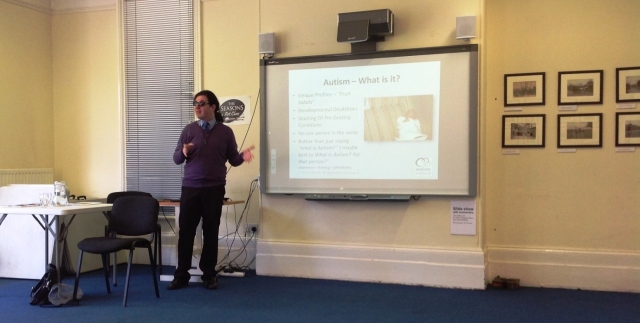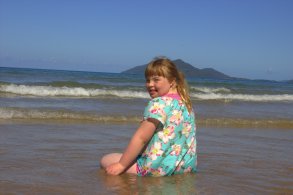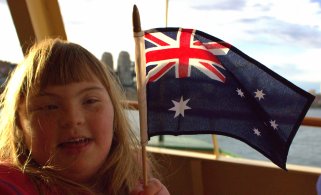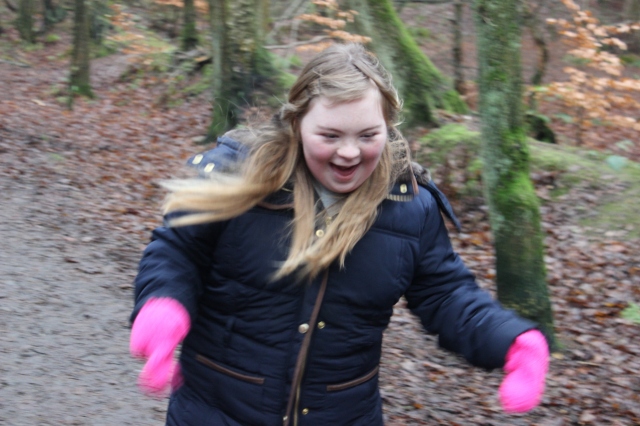-
Recent Posts
Categories
-
Join 21 other subscribers
Archives
Paul Isaacs Presentation at the DSA April 2015
Paul Issacs (Autism Oxford)
Parents told us at previous ASC/DS meetings for families they would really like to hear from someone about what it is like to live with autism, so we arranged for Paul Isaacs (Autism Oxford) to visit DSA and talk about his life.
Paul was very clear from the start that he could only talk about his personal experience and not speculate about the lives of others with the condition. Paul was eager to stress that no two people with Autism are the same. Paul described Autism as a ‘clustering of pre-existing conditions that are specific to an individual’. He suggested that the question parents needed to ask is not ‘What is Autism?’ but rather ‘What is Autism for your child?’
Here is what some parents had to say about the day:
“I thought that the event was interesting and am very pleased that I attended. While our daughter has some issues, it is reassuring that the understanding of both Down’s syndrome and autism is developing at such a rate. It helps me to have a bit more knowledge of what goes on in our daughter’s and our heads Thank you for all your work in supporting families experiencing the dual diagnosis. I do feel that we are “inbetweeners” and it’s nice to know that we are not alone!”
“On Saturday I attended the talk at the DSA by Paul Isaacs. It was organised for parents of children with dual diagnosis – Down’s syndrome and Autism. My son was diagnosed with ASC at the age of 3 and I have often felt we didn’t really belong in the Down’s camp or the ASC camp. Actually we belong wherever we are comfortable and it happens to be at the DSA, who are doing such good work to bring us together and research the condition. Paul’s speech was inspiring. Considering what he has had to overcome, I almost forgot he had autism as he took us into his world and described his childhood and his form of autism so eloquently. I recognised my son in so much of what he said and that was very helpful. For instance, Tom, who is non-verbal, touches people’s faces when greeting them. Paul explained that he also used to do that in order to fully recognise the person in front of him as sight wasn’t enough. An eye opening piece of information for me! This was just one revelation of many and I came away with a greater understanding of my son’s behaviour. The icing on the cake was to spend time with other parents of children with dual diagnosis and share our experiences and advice.”
“Another great day! Information and ideas were swopped, an inspiring talk was given and a delicious lunch eaten. For me, a key value of these days is simply the bringing together of families who live with the pleasures and difficulties of children with a dual diagnosis. It’s always so useful and supportive to hear of the creative ways in which challenges are met. The highlight of the day was definitely the presentation by Paul Isaacs (from Autism Oxford) on his personal experience of living with ASC. To hear such a fluent and well delivered talk from an individual who started life with severe challenges was quite inspiring. The insights he conveyed helped me, for the first time, to appreciate how the world looks and feels to an individual with ASC. There were many moments when the ‘penny dropped’ as Paul explained the reason why certain behaviours might happen, why some interventions help and some do not. It was powerful stuff and one of the most useful talks on ASC that I have ever heard. Thank you DSA for organising this and for your continued support for the children and adults, and their families, who live with dual diagnosis.”
In the afternoon, we asked parents whether there was any other information that would be useful to upload to DSA’s ASC/DS web pages The general feeling was the web pages contained all the information that parents needed before and after their child was given a diagnosis of ASC/DS.
We are always looking for suggestions about how we can improve the information we provide. If you have any suggestions for improving our ASC/DS web pages, you can send them to stuart.mills@downs-syndrome.org.uk
We also talked about DSA’s Having A Voice Project . We discussed ways in which people with dual a diagnosis could be involved in the Project. One suggestion from a parent about how her son could be included was by making a film of him doing things he enjoys.
The next meeting for parents at DSA’s National Office is on 3 October 2015. Julie Calveley of Interact will be talking about meeting the fundamental communication needs of people who have severe learning difficulties. Please go to our dedicated page for further information about the meeting
We will continue to seek funding to hold these meetings and are currently thinking about how we can most effectively support families to ensure they have the information and support they need. If you have any suggestions, you can send them to stuart.mills@downs-syndrome.org.uk
All in all we had a very constructive, informative day with great feedback from the parents who attended. Paul’s presentation can be downloaded from our website
The last word goes to Paul: ‘How I process information doesn’t define me’
To learn more about Paul and our previous ASC/DS meetings, please visit our website
Autism spectrum condition, complex needs and visual resources
By Gillian Bird, DSA Training Services Manager
Autism spectrum condition
Thank you to the support groups who helped to advertise the ‘Understanding dual diagnosis of Down’s syndrome and autism spectrum condition’ training days for parents and professionals in Manchester on 30 April and 1 May’. The level of interest was so high that the event for professionals was fully booked within a week of being advertised. This will be the first DSA training event for professionals about dual diagnosis of Down’s syndrome and autism spectrum condition. We will be directly informing local practitioners who provide diagnostic and support services for children and their families, which is what our members have asked us to do.
We can run this training in other regions across England and Wales with similar regional funding. Please contact training@downs-syndrome.org.uk if you have an idea about how to fund this in your region. As with all…
View original post 339 more words
Posted in General
Leave a comment








